|
|
|
Sort Order |
|
|
|
Items / Page
|
|
|
|
|
|
|
| Srl | Item |
| 1 |
ID:
178795
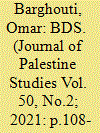

|
|
|
|
|
| Summary/Abstract |
Despite its military, diplomatic, and economic power, Israel’s regime of military occupation, settler colonialism, and apartheid still views the nonviolent, Palestinian-led global Boycott, Divestment, Sanctions (BDS) movement as a “strategic threat” to its system of injustice, waging a protracted war against the movement accordingly. This essay aims to contextualize Israel’s war on BDS by examining the movement’s origins, principles, impact, and theory of change. It analyzes the most critical challenges BDS is facing and its most promising strengths, especially its balancing of ethical principles with strategic effectiveness and its intersectional approach to the struggle for Palestinian freedom, justice, and equality.
|
|
|
|
|
|
|
|
|
|
|
|
|
|
|
|
| 2 |
ID:
178792
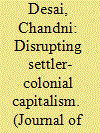

|
|
|
|
|
| Summary/Abstract |
This article explores the resurgence of Indigenous/Palestine solidarity during the Wet’suwet’en land sovereignty struggle in Canada that took place around the same time Donald Trump’s Middle East “peace plan” was released in early 2020. Historicizing this resurgence within a longer period of anti-colonial resistance, the article attends to the distinct historical, political-economic, and juridical formations that undergird settler colonialism in Canada and Israel/Palestine. It contends with the theoretical limits of the settler-colonial framework, pushing back against narratives of settler success, and shows how anti-colonial resistance accelerated economic crises that led both settler states to enter into “negotiations” with the colonized (reconciliation in one case, and peace talks in the other) as a strategy to maintain capitalist settler control over stolen lands. The analysis also sheds light on a praxis of solidarity that has implications for movement building and joint struggle.
|
|
|
|
|
|
|
|
|
|
|
|
|
|
|
|
| 3 |
ID:
178796
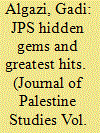

|
|
|
|
|
| Summary/Abstract |
Tasked with selecting two documents specifically related to Israel and the Israeli settler-colonial enterprise from the fifty-year JPS archive, author Gadi Algazi settles on “History’s Verdict: The Cherokee Case” (1995) by Norman Finkelstein and “The Palestinians Seen through the Israeli Cultural Paradigm” (1987) coauthored by Aziz Haidar and Elia Zreik. While the former points to the historical affinities between the Zionist colonization of Palestine and the settlement of North America (including early Zionists’ unabashed identification with the “white” colonizers of the continent), the latter elucidates Israel’s “culturalist account” of Palestinians, which views the main problem with Palestinians in Israel as their “culture,” and not the colonization, repression, and exclusion they experienced historically and continue to endure.
|
|
|
|
|
|
|
|
|
|
|
|
|
|
|
|
| 4 |
ID:
178797
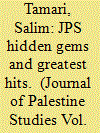

|
|
|
|
|
| Summary/Abstract |
In this essay, emeritus sociology professor Salim Tamari surveys the study of Ottoman Palestine within the pages of JPS, identifying two groundbreaking articles: Beshara Doumani’s “Rediscovering Ottoman Palestine: Writing Palestinians into History” (1992) and Louis Fishman’s “The 1911 Haram al-Sharif Incident: Palestinian Notables versus the Ottoman Administration” (2005). Tamari argues that the two contributions have, in different ways, fundamentally shifted our understanding of a local Palestinian identity within the broader Ottoman-era region of Bilad al-Sham.
|
|
|
|
|
|
|
|
|
|
|
|
|
|
|
|
| 5 |
ID:
178798
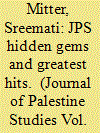

|
|
|
|
|
| Summary/Abstract |
In addition to selecting a “greatest hit” and a “hidden gem,” here, Sreemati Mitter provides readers with a broad overview of Journal of Palestine Studies (JPS) content on the topic of capitalism in Palestine. Mitter singles out Alexander Schölch’s classic, “The Economic Development of Palestine, 1856–1882” (1981) as a greatest hit and Peter Lagerquist’s haunting “Vacation from History: Ethnic Cleansing as the Club Med Experience” (2006) as a hidden gem. Read together, she argues, these two pieces help elucidate how powerful forces of global market capitalism converged on Palestine’s storied Mediterranean coast to shape its economy in the modern period.
|
|
|
|
|
|
|
|
|
|
|
|
|
|
|
|
| 6 |
ID:
178799
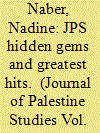

|
|
|
|
|
| Summary/Abstract |
This final essay in the “greatest hits” and “hidden gems” series tackles the topic of activism. Noting the richness and diversity of JPS’s contributions in this regard, Nadine Naber hones in on the necessity for hope and for grassroots mobilization at this Palestinian juncture. She exhorts readers to revisit Jonathan Kuttab’s 1988 essay, “The Children’s Revolt,” and Salim Tamari’s article, “The Palestinian Movement in Transition: Historical Reversals and the Uprising,” which appeared in 1991, for both inspiration and edification. Doing so, she argues, “allows readers to reimagine hope as a political ideology and as a set of practices that foster the possibilities for change and decolonization for years to come.”
|
|
|
|
|
|
|
|
|
|
|
|
|
|
|
|
| 7 |
ID:
178790


|
|
|
|
|
| Summary/Abstract |
Taking the small number of ethnographic studies of Palestinian communities in North America as its problematic, this article situates that predicament in the larger context of decades of academic silencing of Arab American and SWANA (Southwest Asia and North Africa) studies, efforts that represent but one component of a larger political project to quash pro-Palestinian activism. Abetted by the absence of a racial category, scholars continue to face substantial hurdles at the institutional level, inhibiting the robust growth of the field and boding poorly for an expansion in community studies. Yet recent scholarship on Palestinians in North America—exemplified by the articles included in this special issue that center the complexities of identities; activism; and Black, Indigenous, and people of color (BIPOC) solidarities—evidences real changes on the ground for Palestinian activism. Those changes, and continued advocacy for institutional change, are necessary to invigorate community studies, a critically important method of scholar-activist praxis because of their power to enhance a community’s access to resources, well-being, organizing capacities, and local-level power and solidarity building.
|
|
|
|
|
|
|
|
|
|
|
|
|
|
|
|
| 8 |
ID:
178793
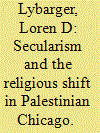

|
|
|
|
|
| Summary/Abstract |
This article analyzes transformations in Palestinian secularism, specifically in Chicago, Illinois, in response to the weakening of the Palestine Liberation Organization and the emergence of Islamic reformist structures since the late 1980s. Up until then, secular community organizations that aligned with the secular-oriented Palestinian political factions constituted the ideological center of this community. Beginning in the late 1980s, however, a discernible religious shift began to take place. The analysis draws from extensive fieldwork (2010–15) to show how secularism has not disappeared but rather transmuted into new, often hybrid forms whose lack of institutionalization reflect the attenuation of secularist structures and orientations. The weakening of the secularist milieu leaves individuals who have become disenchanted with the religious-sectarian shift (at the time of the fieldwork) with few alternatives for social connection, solidarity, and action. They forge their own idiosyncratic paths as a result.
|
|
|
|
|
|
|
|
|
|
|
|
|
|
|
|
| 9 |
ID:
178791
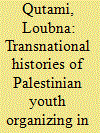

|
|
|
|
|
| Summary/Abstract |
This article explores the transnational histories that have conditioned Palestinian youth organizing in the United States from the 1950s to the present day. It examines the organizational vehicles of earlier generations of activists such as the Organization of Arab Students (OAS) and the General Union of Palestinian Students (GUPS) to trace the formation of the U.S. chapter of the transnational Palestinian Youth Movement (PYM). It argues that in the Oslo and post-Oslo eras, which severed the Palestinian diaspora from the national body politic and the rich Palestinian organizational histories of the pre-1993 period, the lessons of their forerunners are instructive for PYM’s new generation of organizers. The article posits that transnational connections have profound implications for localized U.S. political organizing and that contemporary Palestinian youth organizing is part of a historical continuum. Drawing on oral history and scholar-activist ethnographic methods, the article situates contemporary youth organizing in its transnational and historical contexts.
|
|
|
|
|
|
|
|
|
|
|
|
|
|
|
|
| 10 |
ID:
178794
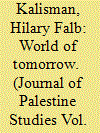

|
|
|
|
|
| Summary/Abstract |
This article contributes to Palestinian intellectual history by discussing the lives and writings of three diaspora intellectuals during the transitional period of the 1950s: Jabra Ibrahim Jabra, Abdul-Latif Tibawi, and Nicola Ziadeh. I argue that they fused a conservative acceptance of state authority and avoidance of radical politics with a liberal understanding of nationalism and scholarship, including freedom, secularism, and objectivity. Without a Palestinian nation-state, their participation in the imagined futures of Pan-Arabism and decolonization meant avoiding radical leftist political movements. Instead, they advanced literature and history, surviving in the diaspora as liberals during Pan-Arabism’s transition from a revolutionary goal to a state ideology.
|
|
|
|
|
|
|
|
|
|
|
|
|
|
|
|
|
|
|
|
|